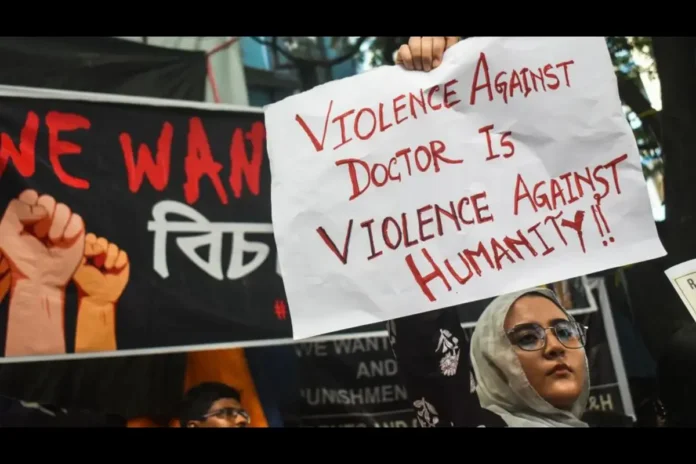India’s medical workers launched a nationwide strike on Saturday, protesting the rape and murder of a trainee doctor in West Bengal.
The Indian Medical Association, India’s largest group of doctors, organized the strike. They aimed to halt all non-essential hospital services for 24 hours across the country.
The strike has significantly impacted patients nationwide, with thousands affected by the suspension of services. Women have led these protests, pushing for a safer work environment for medical professionals. This incident has stirred the nation, prompting a strong response from medical workers and the public alike.
On August 9, police found the body of a 31-year-old trainee doctor at the R.G. Kar Medical College and Hospital in Kolkata. The victim’s body, discovered in the hospital’s seminar hall, showed signs of a brutal assault. Authorities quickly detained a police volunteer working at the hospital, suspecting involvement in the crime. However, the victim’s family believes it was a gang rape and that more people were involved. An autopsy confirmed sexual assault, raising serious concerns about the case.
The investigation has since escalated, with federal investigators taking over after accusations of state government mishandling. This development has further fueled public outrage and intensified calls for justice. The case has drawn widespread attention, with people across the country demanding accountability and action.
On Wednesday night, women across India took to the streets, participating in “Reclaim The Night” marches. These protests highlighted the demand for justice, with some participants calling for the death penalty for the perpetrators. The marches symbolized a broader movement for women’s safety, resonating with many across the nation.
The protests are not limited to the streets. Thousands of medical workers across India are also demanding justice for the victim. They seek assurances of safety for doctors and paramedics within hospitals. Many have halted all but emergency treatments, with more strikes planned for the weekend. This collective action underscores the deep concern among medical professionals about their vulnerability in the workplace.
The Indian Medical Association has appealed to the public, seeking support in their “struggle for justice.” They described the killing as a “barbaric crime” and linked it to the broader issue of unsafe spaces for women. This appeal aims to rally the nation around the cause of justice and safety for medical workers.
In addition to justice for the victim, doctors are calling for stricter laws to protect them from violence. They want any attack on on-duty medics to be classified as a non-bailable offense. This demand reflects the growing concern over the safety of medical professionals, who often work in challenging and unsafe conditions.
Sexual violence against women remains a pervasive issue in India. Many crimes go unreported due to the stigma surrounding sexual violence. The problem is particularly severe in rural areas, where victims face community shame and social pressures. Despite these challenges, the number of reported rape cases has increased in recent years.
In 2022, police recorded 31,516 rape cases, a 20% increase from 2021. This statistic underscores the ongoing crisis of sexual violence in the country. The 2012 gang rape and murder of a 23-year-old student on a New Delhi bus sparked massive protests and led to stricter penalties for such crimes. This case also led to the creation of fast-track courts for rape cases and the introduction of the death penalty for repeat offenders.
The 2013 amendment to the rape law further strengthened legal protections for women. It criminalized stalking and voyeurism and lowered the age for adult trial from 18 to 16. These changes reflect a broader effort to address the epidemic of sexual violence in India, but challenges remain.
The recent events in West Bengal have reignited the debate over women’s safety in India. The protests, led by medical workers and women, highlight the urgent need for systemic change. As the nation watches, the demand for justice grows louder, with the hope that this tragedy will lead to meaningful reforms.


